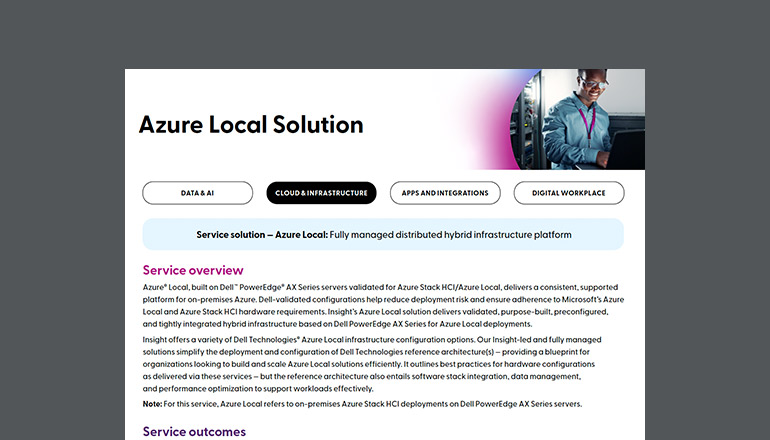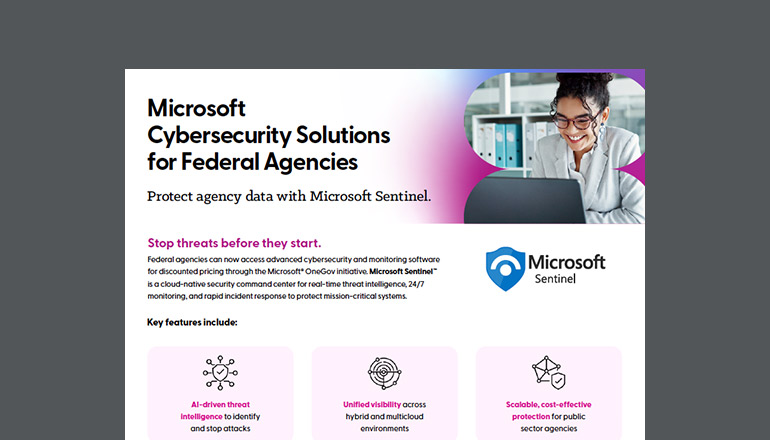Client story Weka Smart Vaccine Fridge Improves Patient Care
A smart vaccine fridge saves healthcare organizations in human resources costs, reimbursements and vaccine spoilage. It also aids in inventory management.
By Insight Editor / 29 Sep 2016 19 May 2017 / Topics: Windows 10 , Microsoft Azure

Facts at a glance
Organization:
Weka Solutions
Client industry:
Health & life science
Challenge:
Weka sought an Internet of Things platform that could collect real-time data from numerous sensors on smart vaccine fridges and send it to both Dynamics CRM Online and databases for real-time analysis.
Solution:
- Raspberry Pi 2 single-board computer
- Windows 10 IoT Core Dashboard
- Microsoft Azure
- Microservice architecture
Results
- 15-minute automatic fridge configuration
- Real-time inventory management
- Consistent temperature regulation
- Reduced human resources costs
Solution area:
Insight’s Digital Innovation solutions help clients incorporate emerging tech into their business operations to improve the customer experience.
Although vaccines continue to save countless lives, many people never receive this simple form of protection. To inoculate more people against diseases, clinicians need an easier, more effective way to safely store vaccines and manage inventory. Each dosage is fragile and expensive. Standard vaccines can cost $100 each, while biologics — vaccines used to treat people with autoimmune disorders — can cost $10,000 per dose.
To avoid spoilage, most vaccines must be stored between 2 and 8 degrees Celsius. However, the commercial refrigerators used by clinicians provide imprecise temperature controls. And clinicians are unable to use standard refrigerators to store vaccines in underdeveloped areas because they require reliable electrical power. Plus, clinicians stock and access vaccines manually. This introduces inventory errors and loss due to inadvertent spoilage and theft.
To overcome all of these storage and inventory challenges, health and life science company Weka Solutions envisioned a smart vaccine fridge that would provide automated controls supported by the Internet of Things (IoT) and the cloud. Not only would the refrigerator include remote monitoring services that ensure vaccines are stored at the right temperature, but it would also come with automated inventory management.
To bring the product to market, Weka first engaged a vendor to design a physical refrigerator with cartridges that store each vaccine in its own slot. Each slot is at least 3 inches away from the side of the fridge, meeting storage protocol mandated by the Centers for Disease Control and Prevention.
In addition, people can only stock and access vaccines through a small drawer on the front of the fridge that measures less than 8 square inches. This design protects vaccines from temperature change by minimizing the influx of warm, outside air.
Controlling access & inventory management
Weka chose to design the kiosk for its vaccine fridge on a Microsoft Surface tablet running the Windows 10 Pro operating system. “We wanted to make the kiosk as friendly as possible, so we quickly honed in on the Microsoft Surface device,” says Alan Lowenstein, chief operating officer at Weka Solutions. “We like its form factor. We like that it’s commercially available, so it’s easy to use and replace if necessary.”
The company worked with Microsoft partner 2B Solutions to develop the inventory management system. After considering an on-premise inventory solution, Weka chose Microsoft Dynamics CRM Online Professional.
“We opted to go with the cloud-based Dynamics CRM Online because we knew it would be easily accessible and very easy to scale quickly,” explains Brandon Hernandez, mobile application developer at 2B Solutions.
To support automated monitoring services, Weka sought an IoT platform that could collect real-time data from numerous sensors on every smart fridge and send it to both Dynamics CRM Online and databases for real-time analysis.
“We need to be able to manage 1,000 or more fridges sitting in 1,000 or more locations around the world,” Lowenstein explains. “To ensure robust and scalable messaging, we chose Microsoft Azure. It provides the middleware we need to manage communication between all our components.”
Hernandez adds, “We found that what we get out of the box with Azure makes a very big difference in terms of implementation time and support going forward.”
How vaccine fridges talk to the cloud
Weka worked with Insight and the smart fridge manufacturer to develop the IoT solution. The company wanted to ensure sensors would continually monitor temperature, motor health, sensor health and appliance location.
A Raspberry Pi 2 single-board computer running Windows 10 IoT Core Dashboard automatically transmits sensor messages — also known as telemetry data — to Azure IoT Hub. In addition, each smart fridge stores all data from user sessions and sends the information to Azure. Twelve Azure Stream Analytics processes, written by Insight's Digital Innovation team, scan incoming messages and route them to one of these Azure services:
- SQL Database stores each telemetry data message with a time stamp so analytical processes can monitor the health and temperature of every fridge and quickly identify any anomalies that indicate a possible appliance issue.
- DocumentDB stores a standard appliance manifest the fridge accesses when it’s first powered up, as well as a current snapshot of fridge inventory. Insight chose DocumentDB to store inventory information because its unstructured format makes it easy to support future Business Intelligence (BI) solutions.
- Blob storage serves as an affordable historical archive that includes every message every smart fridge generates over its lifetime.
- Service Bus supports communication with Dynamics CRM Online.
One messaging library, countless opportunities
We developed eight microservices to facilitate the flow of information between solution components. Services access data stores and Dynamics CRM Online using Representational State Transfer (REST) APIs managed by the Azure API Management portal.
“By using a microservice architecture, Weka Solutions can add new features to one service without touching the others,” notes Bob Familiar, director of Insight's Digital Innovation national practice. “And everyone working on this solution used Visual Studio 2015, .NET Framework and the C# programming language. That way, the messages that passed between fridge sensors, Azure and Dynamics CRM used the same library so all our software solutions easily work with each other.”
To accelerate solution implementation, we automated the provisioning, build and deployment of all of the Azure-hosted services using Windows PowerShell. “When a clinician purchases a smart fridge and powers it up, scripts automatically configure the appliance’s kiosk to include specific information about the clinic and the product catalog from Azure,” Familiar explains. “The process takes about 15 minutes.”
2B Solutions also collaborated with the smart fridge manufacturer so the kiosk software controls the smart fridge. For example, to add or dispense a vaccine, clinicians log on to the kiosk and specify what they need to do. The smart fridge then pops open a door with access to a single vial. If the clinician is adding to inventory, he or she inserts the vaccine into the slot; if dispensing a vaccine, he or she removes it from the slot. Once the clinician closes the door, the kiosk sends a message to Azure and then to Dynamics CRM noting the inventory change.
Minimizing financial losses for clinicians
The vaccine fridge enables clinicians to reduce financial losses.
“Physicians generally have $40,000 to $60,000 worth of vaccines in their refrigerators,” says Lowenstein. “If the clinic suffers a power outage or the traditional fridge fails, they risk losing the entire inventory of vaccines. By using automated processes in Azure and Dynamics CRM Online to manage inventory and deliver proactive alerting, our customers ensure vaccines are stored at the right temperature. We also make sure that the first vaccines in the refrigerator are the first ones that come out, so patients never receive an expired or recalled vaccine.”
In addition, Weka estimates a medical practice that dispenses approximately 400 vaccines per month could reduce human resources costs by more than $1,000 per month. They can also avoid losing thousands of dollars per month in reimbursements, which happens when staff forget to record vaccines correctly in patient records.
Further, practices can avoid losses due to vaccine spoilage. Weka and clinic employees are notified in real time via email or text message if the temperature of any smart fridge begins to change, so the appliance can be proactively serviced.
From the Weka Solutions portal, users can access information about their smart fridge from a customized dashboard supported by Azure IoT Suite dashboard. Clients’ dashboards show real-time information about their fridge, including its temperature. In addition, they can view real-time inventory information and an event log that shows when individual vaccines were stocked and dispensed — and by which users.
High availability & support
The smart fridge works even if there’s an electrical or cloud outage. “We architected a three-tiered solution on the Microsoft platform, so every part can continue to work without the other,” says Lowenstein. “If we lose connection to Azure because of network issues, it doesn’t impact the real-time processes that are managed on the Windows Surface device. It can still dispense. It can still accept new inventory. And all of the data will be sent to Azure once it’s available.”
In addition, the smart fridge runs on DC power, which means the unit can run on electricity from a power company or from a backup battery.
“Because it can run on a battery, our smart fridge can also be charged by a solar panel,” Lowenstein continues. “So clinicians in Africa and other areas where power is unstable or inaccessible can use our smart fridge to store and dispense vaccines. And the fridge is small enough that you can put it in a van. So if you can’t bring the people to the vaccine, you can bring the vaccine to the people.”
Improving the vaccine supply chain & patient health
By choosing Azure as the software foundation for its smart vaccine fridge, Weka can easily develop new services for clinicians. For example, it can develop BI that shows vaccine usage over time so they can better predict upcoming demand.
“With data collected in Blob storage, we can easily pull that into Azure Machine Learning or Hadoop to create more advanced types of analytics,” Familiar says. In the future, Weka could also grant vaccine manufacturers access to specific types of data through its REST APIs so they can better understand the supply demands specific to each region.
“Our goal is to provide real-time dispensing data, so we can let distributors and manufacturers know if there may be upcoming vaccine shortages at specific clinics or in certain areas,” says Lowenstein.
“And if a clinic unexpectedly runs out of a vaccine, we can let it know if there’s a physician’s office a few miles away that has a surplus of that type of vaccine in stock. While this new insight we gain using Azure and Dynamics CRM Online provides value that can improve the supply chain, from the distributor on up to the manufacturer, the biggest benefit is ensuring patient safety and improving global health by making sure more people are vaccinated against disease.”



